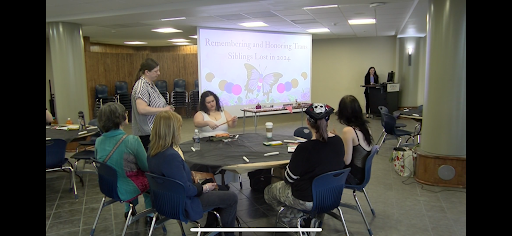Ben Mehic, Managing News Editor
Most people – or rational ones, at least – would agree that individuals should have the right to do whatever they wish with their lives, including pursuing their dreams, having the freedom to love and the liberty to express themselves. But should people have the right to end their lives in order to alleviate themselves of suffering?
Currently, only five states in the United States (California, Montana, Oregon, Vermont and Washington) have legalized physician-assisted death in some capacity. New York, however, could be the next state to legalize assisted suicide with New York State Assembly Bill #A10059, or The Medical Aid in Dying Act,” intending to “amend the public health law in relation to a terminally ill patient’s request for and use of medication for medical aid in dying,” according to the Resource Center for Independent Living.
Associate Professor of Philosophy Christopher Riddle, who spoke at the RCIL Medical Aid in Dying Conference on Nov. 3, believes the bill will impact everyone, including millennial-aged students attending Utica College.
“It’s easy to think that we’re young now and that death is far off, but we all have loved ones that are elderly and we all have loved ones that will perhaps die tragically early. This is an issue that all of us are going to at some point face,” Riddle said. “So while it might not appear to be relevant immediately, this is an opportunity to change legislation to ensure people have control of their end of life care.”
While the U.S. is generally considered a progressive nation, other countries have discussed and implemented laws regarding assisted suicide decades before the topic arose in the states. Switzerland, for instance, approved a form of medical assisted suicide in 1940.
According to Riddle, the prominence of religious rights organizations has caused a stronger voice in influencing policy in the U.S. than in other countries. Disability rights activists have also suggested that people with disabilities are going to be influenced into “hastening their death experience because they don’t want to be a perceived burden on their families,” Riddle said.
Scott Mckinnon, a junior, considers death to be a choice and is a proponent of the aforementioned bill.
“I think it’s important for this bill to pass because assisted death is one of the most efficient ways for legislature to prevent pain and suffering,” Mckinnon said. “It allows for unnecessary pain and suffering to be stopped in circumstances where there is no clear path forward.”
Alexis Taurisano is also a supporter of the bill, but believes there should be certain parameters.
“I think it’s okay as long as they’re terminally ill. It’s fine, if they’re really suffering,” Taurisano, a sophomore, said. “If the doctor administers it, then everything should be fine, as long as there’s a line. People should really be suffering for it to go through.”
Death, while unfortunate, is often unplanned. It’s also something that’s inevitable, even though it’s often difficult to even grasp the reality of potentially never experiencing the joys of life again. The legislation, at least to those who support it, will put the power back into the people – rather than the disease or illness that’s impacted their way of life.
“It’s important because all of us are going to die and all of us are going to have loved ones that die,” Riddle said. “This is really about autonomy and exercising control in the way in which we live and die. It’s really about avoidance of suffering and granting people the choices of their end of life care.”


















![President Todd Pfannestiel poses with Jeremy Thurston chairperson Board of Trustees [left] and former chairperson Robert Brvenik [right] after accepting the university's institutional charter.](https://uticatangerine.com/wp-content/uploads/2023/10/unnamed.jpeg)



















































































































